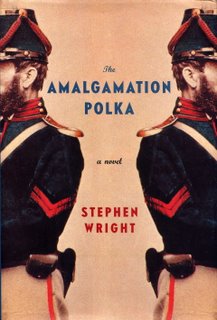 A HOUSE DIVIDED
A HOUSE DIVIDEDThe Amalgamation Polka by Stephen Wright is a dark historical novel of the Civil War, and is the story of Liberty Fish, child of Abolitionists, grandson of slave holders, who is both a witness to and participant in the violence that has shaped (and maimed) America since it's beginning. An episodic ramble, it reads like a post-punk Twain, or maybe a Cormac McCarthy with more of a sense of humor, riffing on polarities of slavery and freedom, black and white, and the high ideals of America versus the reality of the vicious racist lies it tells itself. On a sentence by sentence level, it's one of the best written novels I've read in the past few years, but it somehow lacks the grand narrative sweep of other recent books like Underworld by Don DeLillo or Pynchon's epic Mason & Dixon. The main flaw of the book is that the the main character, Liberty, is too much a cipher. He's a rather blank viewpoint character who, with the notable exception of his impetuous enlistment in the Union army, is not an actor, but is acted upon. That said, Wright's set pieces are richly imagined, from a colorful trip down the Erie Canal, to blood stained battle fields, to a vividly cruel flashback of Liberty's mother Roxana's childhood on a slave plantation, and finally a return to that ancestral home where he finds his lunatic grandfather scheming to turn black slaves white through insane psuedo science. There's a mad brilliance to much of the writing that does recall Pynchon, but it's much more tightly wound and savage, with fewer flights of fancy.
The book's quite different from Wright's first three novels which explored more modern subjects, like Vietnam (Meditations in Green), UFO cultists (M31: A Family Romance), and that cliche of 80s and 90s edge fiction, serial killers. Going Native was that serial killer novel, albeit one with the imprimatur of a Toni Morrison blurb, and it brought my attention to Wright's work a few years ago (he was sporting a Joy Division T-shirt in his author photo which also intrigued me). It would seem that a Civil War novel would be outside his field of interest, but he realizes that the seeds of today's Red State /Blue State divide were sown in those times, and that as William Faulkner (another prime influence here) once said, "The past is never dead. It's not even past".
Here's an recent interview with Stephen Wright from the KCRW show Bookworm.


0 Comments:
Post a Comment
<< Home